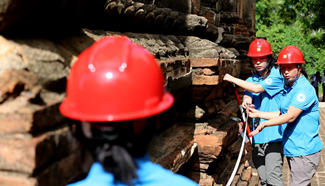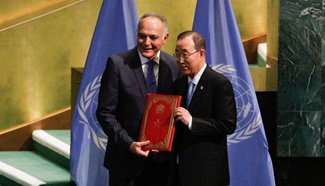NEW YORK, Sept. 22 (Xinhua) -- Chinese Premier Li Keqiang on Tuesday evening attended a welcoming dinner party organized by American economic and business groups.
In his speech, Li reviewed how China-U.S. relations and practical cooperation has grown from scratch to its present stage, saying that China, the world's largest developing country, still has a long way to go before it achieves modernization.
The steady growth of the Chinese economy not only generates more jobs for China, but also offers a boost to the U.S. economy, he said. "The two economies are highly interdependent."
The welcoming party was organized by the Economic Club of New York, the National Committee on U.S.-China Relations, and the U.S.-China Business Council.
Li said that China will stay committed to reform and opening up and continue to follow a path of peaceful development.
China stands ready to work with the United States in a spirit of mutual respect and win-win cooperation to expand their common interests, jointly uphold the international order established since the end of the Second World War, and promote strong, sustainable and inclusive global economic growth, the premier said.
Below is a transcript from the question and answer period following the premier's speech.
William Berkley, founder of W.R. Berkley Corporation and Board of Trustees Chair at New York University: Premier, as Chinese companies seek to do business and make investment around the world, it's important that its market becomes open to investors around the world. How do you see that evolving, and how do you see the market of China becoming more open?
Premier Li: In the early days of China's opening-up, we put most of the emphasis on "bringing in" foreign investment. But today, in this age of globalization, China needs to work with multinationals, and Chinese companies are making investment overseas. So now, we are paying equal attention to "bringing in" and "going global."
For a developing country like China, it is still important to attract massive foreign investment, which helps boost the Chinese economy. As you may know, total paid-in foreign investment made in China has reached 1.7 trillion U.S. dollars. For 24 years in a row, China has been the largest recipient of FDI among developing countries. And going forward, we hope that China will remain an attractive destination for foreign investment. We need foreign investment for economic growth. And more importantly, we need new managerial expertise and advanced technologies that foreign investment brings to China. But let me make one thing clear. We place no preconditions on technological cooperation, and we don't have a mandatory requirement for technology transfer.
At the same time, I have heard business leaders of foreign invested companies complaining about restrictions in accessing certain sectors of the Chinese market. To them I want to say this. It has not been that long since China launched its reform and opening-up program. Many sectors are still in a maturing process, which is also a process of further opening up. The areas of the Chinese economy open to foreign investment will only increase. China will open its door wider, and this door will never close. For those of you who have the capital and intention to invest in China, you are more than welcome to do so. Specific projects can be discussed later. (Laughter)
Thomas W. Farley, chief operating officer of New York Stock Exchange Group: Premier Li, thank you so much for being here and thank you for having us in your hotel. It truly is an honor and thank you very much. The U.S. and China need each other more than ever, and are the two strongest economies. You've spoken in your speech about mutual respect, and there is no doubt about mutual respect. At the same time, we have noticed the problem of mistrust between the two countries. In the U.S., there are negative articles in the press about currency rate setting or the respect for intellectual property in China. And the Chinese press also finds negative things about the U.S. My question truly is what can we do about this mistrust and how can we reduce the level of mistrust and increase the level of cooperation?
Premier Li: It's true that there are misconceptions and differences between our two countries. But I believe the level of mutual understanding between our two countries far outweighs that of misconception and differences. It is natural to have differences on specific matters, and they need to be properly viewed and handled. Just now you said "coming to my hotel." But I want to make a correction here for the record. That is, as far as I know, a Chinese private company has acquired stakes in the hotel, but the hotel is still under long-standing management of American businessmen. (Applause) So I'm still staying at a hotel run by Americans. (Laughter and applause)
Talking about media coverage of each other's countries, I think we need to take a look at the whole picture. If you read news from certain media, I will not name them to avoid advertising it, perhaps you will find some reports on the other country. Sometimes truthful and objective coverage may not get people's eyes. But nitpicking does. Certainly if it is a well-intentioned report, even if it is critical, I believe it is welcomed, because it helps both sides to improve what we have been doing.
As for the question of the RMB exchange rate, it will take quite some time to dig into the details. In a word, there is not a basis for continuous devaluation of the Chinese currency, and China has no intention to use the devaluation of the currency to boost exports, because that is not good for China's economic upgrading.
As for how to boost mutual trust and narrow misconceptions, I think the key lies in closer mutual exchanges. As far as I know, last year, Chinese tourists made over 2.6 million visits to the United States, and now there are some 600,000 Chinese students in the U.S. But I also know that many Americans have not been to China yet. So the key to removing misconceptions and increasing mutual trust lies in strengthening people-to-people exchanges and promoting candid discussions among them. (More)











